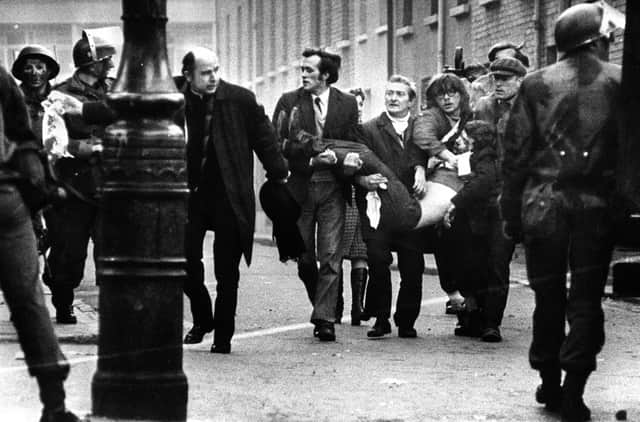Man ‘posing no threat’ when hit by bullet on Bloody Sunday


Michael Bridge claims he was targeted with increasing frequency around the anniversary of the killings in Londonderry, and also threatened with prosecution by the Army.
Mr Bridge, 72, is seeking damages over injuries he sustained when British soldiers opened fire on civil rights demonstrators in January 1972.
Advertisement
Hide AdAdvertisement
Hide AdThirteen people were shot dead by the Parachute Regiment, while a fourteenth victim later died of his wounds.
Civil actions were brought by victims and their families after a major tribunal established the innocence of all those killed and wounded.
The Saville Inquiry’s findings in 2010 prompted the then Prime Minister, David Cameron, to publicly apologise for the actions of the soldiers.
He described the Bloody Sunday killings as “unjustified and unjustifiable”.
Advertisement
Hide AdAdvertisement
Hide AdMore than £1.8m has already been paid out in settlements and awards made in 16 other compensation cases.
In court today counsel for Mr Bridge opened his claim by describing the events leading up to him being shot in the leg.
He had been on the civil rights march as a steward when demonstrators were hit by water canon, gas and rubber bullets at the William Street barricade.
Ronald Bentley QC said his client headed towards the Rossville Flats, where he was informed that 17-year-old Jackie Duddy had been fatally wounded.
Advertisement
Hide AdAdvertisement
Hide AdHe saw the then Father (later Bishop) Edward Daly and others crouching over the dying teenager.
The court heard Mr Bridge, an amateur boxer at time, turned towards the paratroopers with his arms raised in anger.
“He admits that he gave the soldiers, in his words, a mouthful,” Mr Bentley said.
“Witnesses have suggested he actually said ‘Shoot me you b*******, shoot me’, or ‘If you’re good enough to shoot other people you’re good enough to shoot me’.”
Advertisement
Hide AdAdvertisement
Hide AdAccording to his barrister Mr Bridge was on his own, in open ground, and posing no threat when he was hit by a bullet.
The Saville Inquiry concluded that he threw either a half brick or stone towards the soldiers, although he doesn’t remember any such action.
Mr Bridge was shot in the leg by a lieutenant identified only by the cipher Solider N.
He is convinced it had been an attempt to kill him which failed only because he was a moving target, the court was told.
Advertisement
Hide AdAdvertisement
Hide AdSubsequent claims by Soldier N that Mr Bridge was carrying some sort of smoking object were found to have been a false “invention”, counsel said.
“A specific lie was made up in relation to this man, as opposed to the general lies referred to previously in this case,” he added.
It was claimed that Mr Bridge targeted by the security forces after Bloody Sunday.
“His home was repeatedly raided, he was regularly stopped in the street,” Mr Bentley contended.
Advertisement
Hide AdAdvertisement
Hide Ad“The frequency of these events increased substantially around the date of Bloody Sunday when there was an annual march taking place.”
Challenging the claims being introduced, David Ringland QC, for the Ministry of Defence, argued that they were “bland contentions” raised without prior notification.
But Mr Bentely continued: “One of the allegations would be that the Army threatened to prosecute Mr Bridge for armed robbery.
“He immediately went to the police who said that’s nonsense, there’s absolutely nothing in it.”
Advertisement
Hide AdAdvertisement
Hide AdWith Mr Ringland repeating his opposition to the new material, the judge agreed that he was entitled to seek more details.
Adjourning the hearing, Mr Justice McAlinden suggested police records could be checked for any reference to the alleged incidents.